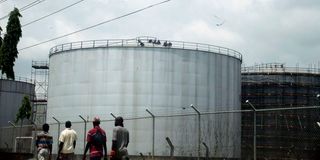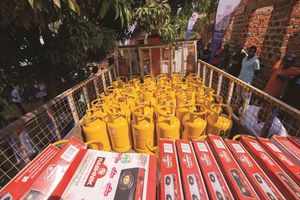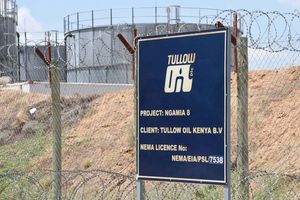
Pedestrians walk past the Kenya Petroleum Refineries Limited in Changamwe, Mombasa.
An oil regulator and a gas distribution firm are feuding over multi-billion-shilling funding and control of petroleum strategic stocks.
This emerged during the scrutiny of the 2025/26 budget estimates where the Kenya Petroleum Refineries Limited (KPRL) accused its regulator, the Energy and Petroleum Regulatory Authority (Epra) of usurping its powers.
KPRL complained of interference with its legal mandate by Epra on the importation of strategic petroleum stocks, and the quota allocation of oil imports.

National Oil Corporation of Kenya CEO Leparan ole Morintat.
Leparan ole Morintat, the KPRL chief executive, told Parliament to amend several sections of the Energy and the Petroleum Act to remove ambiguity on its roles with that of the Epra.
The borne of contention is the failure by the Petroleum Act, 2019 to remove the ambiguity on the words “the National Oil Company,” Ole Morintat said.
He said the Energy (Petroleum Strategic Stock) Regulations, 2008 were issued to provide that strategic stocks shall be maintained for premium motor spirits, illuminating kerosene, jet fuel, automotive gasoil, and liquefied petroleum gas (LPG) at levels equivalent up to 90 days of consumption.
And that the strategic stock shall be procured by the National Oil Corporation of Kenya (Nock) and stored by the Kenya Pipeline Company Limited
The regulations also provided that the Parliament shall appropriate the monies for the procurement of the strategic stocks with effect from 20208/09 financial year progressively until optimal levels of 90 days’ consumption is attained.
“However, the funding was never provided to the National Oil Corporation of Kenya Ltd. To cure the funding gap, Section 107(1) of the Petroleum Act, 2019 provides for establishment of the Consolidated Petroleum Fund to cater for strategic petroleum reserves,” Mr Leparan said.
Objection letter
“Strangely, contained in the draft Petroleum (Strategic Stock) Regulations, 2020 gazetted by the Cabinet Secretary, Ministry of Petroleum and Minimising for public participation, the regulation states that the Cabinet Secretary through a competitive tendering process, would select an oil marketing company (OMC) and not the National Oil Corporation of Kenya Ltd, to supply petroleum prices for the establishment and maintenance of the strategic stocks.”
He said NPCK submitted a written memorandum to Epra objecting to regulation 6 that sees to delineate its mandate of procuring and managing strategic petroleum reserves.
Mr Lepran told the committee to among other recommendations to amend the Petroleum Act, 2009 to provide for Nock to procure, manage and replenish the strategic stocks in the wording of Legal Notice No. 43 of 2006 save for section six.
Nock also wants MPs to uphold legal notice No.98 of June 18, 2010 that established a portion of the oil import requirement s to be known as the petroleum products quota allocation and shall be imported by the National Oil Corporation of Kenya Limited.
“I humbly request you Mr PS (Mohamed Liban) to address this sibling rivalry internally. We ae dealing with the budget. I hope we will find time during our retreat with you to resolve this matter,” Mr Gikaria, who chairs the committee told the PS for Petroleum.
Appearing before the committee to defend the State Department for Petroleum budget for the year 2025/26, Mr Liban told lawmakers that funding was not provided for the NOCK to the National Corporation of Kenya to cure the funding gaps under section 107 (1) of the Petroleum Act, 2020.

PS Mohamed Liban.
Mr Leparan told lawmakers that the Corporation submitted its written memorandum objecting to regulations 8 that seeks to delineate its mandate o procuring and managing strategic petroleum resource.
The KPC argued that in legal notice No 96, Ministry of in June 19, 2024, gave the Ministry for Energy and the KPRL the power to select competitively candidates who will sit in the oil marking company (OIMs) and not the National Oil Marking company of Kenya to supply petroleum products for the established companies.
Presenting NOCK’s budget for the financial year 2025/36, Mr Morintat asked the committee to increase allocations to help it offset liabilities worth Sh8.7 billion which comprises bank loans amounting to Sh5.9 billion.
He told the committee led by Nakuru Town East MP David Gikaria that Nock owes KCB Sh3 billion, Stanbic (Sh2.9 billion) and Sh2.8 billion relating to other creditors.
He said shareholders are engaging with the banks with a view to settling the same, enhancing efforts to collect outstanding trade debts and use to partly offset the creditors.









